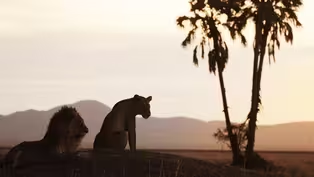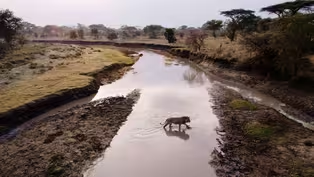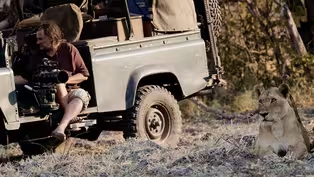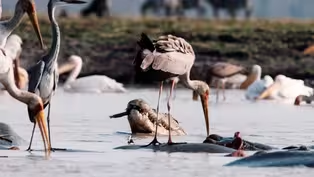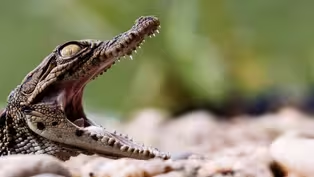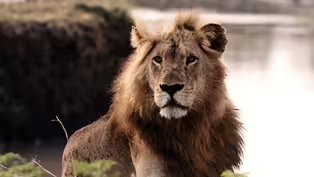
Sanctuary | Katavi: Africa's Fallen Paradise
Season 43 Episode 10 | 54m 3sVideo has Audio Description
Meet the hippo, crocodile and lion families navigating the dry season in Katavi National Park.
Katavi National Park is typically a lush paradise for wildlife in Tanzania. However, the upcoming dry season looms more threatening than ever before. Meet the hippo, crocodile and lion families who must navigate this change of seasons.
See all videos with Audio DescriptionADProblems playing video? | Closed Captioning Feedback
Problems playing video? | Closed Captioning Feedback
Major support for NATURE is provided by The Arnhold Family in memory of Henry and Clarisse Arnhold, Sue and Edgar Wachenheim III, The Fairweather Foundation, Charles Rosenblum, Kathy Chiao and...

Sanctuary | Katavi: Africa's Fallen Paradise
Season 43 Episode 10 | 54m 3sVideo has Audio Description
Katavi National Park is typically a lush paradise for wildlife in Tanzania. However, the upcoming dry season looms more threatening than ever before. Meet the hippo, crocodile and lion families who must navigate this change of seasons.
See all videos with Audio DescriptionADProblems playing video? | Closed Captioning Feedback
How to Watch Nature
Nature is available to stream on pbs.org and the free PBS App, available on iPhone, Apple TV, Android TV, Android smartphones, Amazon Fire TV, Amazon Fire Tablet, Roku, Samsung Smart TV, and Vizio.
Buy Now
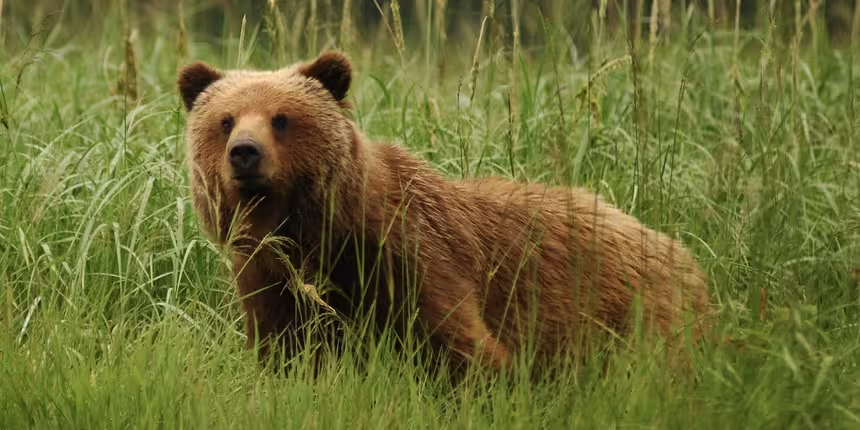
Explore More Ways to Watch
Bring the beauty and wonders of wildlife and natural history into your home with classic NATURE episodes.Providing Support for PBS.org
Learn Moreabout PBS online sponsorshipMore from This Collection
In the heart of Africa’s Great Rift Valley lies Katavi, a little-known National Park spanning more than three thousand square miles of western Tanzania. Here, Nature’s filmmakers capture a once-in-a-lifetime event – a severe drought followed by heavy rains that test the survival skills of all those who call Katavi home.
Salvation | Katavi: Africa's Fallen Paradise
Video has Closed Captions
After drought, the rains finally come. But can Katavi survive the flooding? (54m 2s)
Purgatory | Katavi: Africa's Fallen Paradise
Video has Audio Description
A severe drought in Katavi National Park tests the wildlife to their limits. (54m 3s)
Providing Support for PBS.org
Learn Moreabout PBS online sponsorship♪♪ -Hidden in the heart of Africa lies a place of wonder.
♪♪ This bountiful terrain draws migrants in their thousands.
But not all can make such journeys, and so this rugged land is the permanent home of three tribes... hippos... crocodiles... and lions.
Each wary of the other.
Their stories unfold in parallel.
They live in harmony... more or less.
Until a fierce climatic cycle turns their world upside down.
[ Roars ] Relentless drought... turn tussles over territory into battles for survival.
[ Thunder crashes ] What should be life-giving rain delivers floods of biblical proportion.
These age-old floodplains are no longer ruled by vagabond lions... but by a greater power.
This is Katavi.
♪♪ ♪♪ ♪♪ -At the heart of Africa's Great Rift Valley in Western Tanzania lies an ancient ribbon of land, remote and inaccessible.
Katavi is almost 2,000 square miles of unspoiled wilderness.
♪♪ Life here is not for the faint-hearted, but at times, it's a place of plenty.
Rivers and fertile floodplains provide for giants.
Hippos in their thousands spend their nights spread out across these lands, plodding many miles as they graze.
At dawn, bellies full, they return to the sanctuary of the Katuma River.
[ Hippos grunting ] But they must pass through lion territory.
Riverbanks are patrolled by Arthur, an 8-year-old male in his prime... and his family.
Hippos are tough prey even for a pride of lions.
But these daily gatherings sometimes provide an opportunity.
Patch, the oldest and wisest lioness, knows it's always worth looking out for vulnerabilities.
♪♪ ♪♪ ♪♪ ♪♪ This morning, nothing seems out of the ordinary, at first glance.
A healthy 3,000-pound adult hippo is too much to tackle.
But a baby?
With her mother close by and surrounded by family, she's safe.
The lions needn't take risks.
They can bide their time.
Perhaps the little one will stray.
The hippo mother knows she must get her baby safely to water, but positions in the river are strictly allocated and controlled by the alpha male.
It's important to find the right spot.
The hippos are jostled closer together, and their patience begins to wear thin.
Warnings keep everyone in check.
There has been less rain than usual, so the water level is dropping.
The lions can sense the hippos' unease.
But the hippos have a bigger problem than the lion pride this morning.
This bull is an interloper.
He knows he shouldn't be here.
He's trying his luck and hoping to stake a claim to this stretch of river.
But this is the rightful lord of these waters.
Scattering dung signals his alpha-male status.
♪♪ Challengers are not tolerated.
♪♪ Nearby, families are anxious.
Getting caught up in a fight risks injury.
The newcomer is younger and stronger... and is not backing down.
The alpha loses his footing and seems to be retreating.
But he's not beaten.
Just wily.
He tricks the challenger into switching places.
♪♪ ♪♪ ♪♪ Now he's in prime position in the river... and has regained the advantage.
Saber-sharp teeth can slice through the toughest hippo hide.
Fights like this one can be to the death.
The harem knows that if the alpha loses, the challenger will slaughter his offspring.
But some battles are not worth pursuing.
Injuries are best avoided, especially with lions around.
Outsmarted, the young challenger surrenders.
The shrewd old bull has kept his crown and kept his family safe.
Patch senses weakness.
The exhausted and retreating hippo presents an opportunity to give her daughters a hunting lesson.
But she's misjudged him.
This hippo has had enough drama for one day.
He's not ready to take a beating from the lions, as well.
But avoiding the path of a charging hippo is a lesson worth learning.
The pride will go hungry this morning... a feeling that's becoming more familiar by the day.
It's late summer, and by now, herds of buffalo should be migrating through Katavi.
A seasonal bounty that provides the lions with plentiful hunting opportunities.
Something is off this year.
Other migrants are arriving.
Arthur's eyes are on the horizon, searching for signs of buffalo.
♪♪ ♪♪ Katavi is the crossroads of East Africa.
♪♪ ♪♪ Its lush floodplains draw travelers from far and wide.
And where there's an abundance of prey, traveling predators follow.
These are age-old migrations.
Journeys that have been made across the continent for countless generations.
Huge flocks of white pelicans sweep in, guided by instinct.
Usually, these vast wetlands provide year-round valuable resources for a multitude of both resident and transient species.
Herds of elephants know Katavi's plains of old.
Inherent memories recall a reliable offering of food and water.
For the newcomers, the scent of anticipation hangs in the air.
It's a rare week that Katavi sees no rain at this time of year.
It's already been six.
The receding water levels attract hungry birds in their thousands from across East Africa.
It's a gathering that happens briefly just once a year.
This timely arrival of all these animals is no coincidence.
Although they're here for different reasons, their presence is orchestrated by a greater force.
The shifting climatic cycle of the Katavi ecosystem.
It creates a phenomenon eagerly anticipated by crocodiles.
These prehistoric titans are the longest-lived of Katavi's resident tribes.
Some are known to be 90 years old.
They're patient, opportunistic, and supreme hunters.
These fishing parties are one of nature's most surprising alliances.
Gray herons and yellow-billed storks vie for prime positions on grumpy fishing platforms.
Frightening for a baby hippo who's never encountered these lanky birds before.
But their older siblings have got the hang of things and enjoy the back scratch.
The birds have timed their arrival to perfection.
The rising heat triggers algal blooms in the shallow water.
Deprived of oxygen, catfish are forced to the surface.
Right into the jaws of death.
Herons are precision hunters.
Pelicans have a more smash-and-grab approach... netting several fish at once in their expanding throat pouches.
The commotion is guaranteed to annoy the territorial alpha male.
In the melee, catfish are driven towards the storks and herons, all mutually helping each other to feed.
But the crocodiles are surprisingly relaxed.
They could swallow a stork in one snap of the jaws, but it's not in their interest to eat the birds.
Instead, they work with them, forming a floating dam... a deadly trap from which the fish have no escape.
The crocs benefit, too.
A high-quality protein catfish feast could sustain them for a whole year.
This extraordinary ability to go long periods without food allows them to withstand times of shortage, which other species might not survive.
By working together, everybody benefits.
Well, everybody but the catfish.
Even a young fish eagle gets in on the action, swooping in to show everyone how to hunt in style.
Eventually.
Katavi's fishing parties are quite the spectacle.
But the wild-dog pack have their eye on a different prize -- reedbuck, fleet-footed and, on these open plains, impossible for the lion pride to ambush.
But dogs are different.
The chase is on.
The dogs can reach speeds of 40 miles an hour.
So can reedbuck.
So they must outmaneuver the pack.
A single slip... a twist of fate.
On Katavi's plains, fortunes change in a heartbeat.
Life and death walk side by side.
[ Elephant trumpets ] An elephant mother has carried this little one for 22 months.
He's not even an hour old.
And already, he's trying to find his feet.
The plains seem an exposed place to give birth.
But the elephants know what they're doing.
The family circles to protect him.
They can see predators approaching from all directions.
A little help from grandma is welcome.
His next task is to find his mother's teat for his first drink.
Not easy when you're still a bit wobbly.
With her trunk, mom passes him a sip of milk for encouragement.
That tastes good.
Definitely worth finding more.
Now he's got the hang of it.
A newborn is a source of excitement in the herd.
Family members introduce themselves by gently nuzzling him with their sensitive trunks, the beginning of deep bonds that will last his lifetime.
His 3-year-old sister is eager for her share of milk.
Her new tusks could easily injure her baby brother while they feed.
So mom will start gently weaning her older calf as soon as possible.
Vultures, the Katavi cleanup crew, are attracted by the afterbirth, a feeding opportunity.
[ Elephant trumpets ] Mom's not happy with them.
The commotion will soon attract predators.
And it's done just that.
♪♪ ♪♪ ♪♪ ♪♪ But an elephant matriarch is hard to intimidate, and grandma stands up to the threat.
She's dealt with their kind many times before.
The lions quickly calculate that taking on this family is not worth the risk.
With the threat gone, the mother finally does something rather unusual.
Elephants usually just nap standing up.
But like all exhausted moms, she's earned a proper sleep.
Still no rain, and the waters on the sweltering plains continue to recede.
Most migrants have moved on.
Katavi's residents return to the cool of the forest.
[ Monkeys chattering ] This lioness knows that vervet-monkey alarm calls can mean only one thing... leopard.
If it's stashing a kill, the lioness could steal a meal.
This leopard has no food.
But she does have a new baby.
And lions have been known to kill leopard cubs.
Allowing him to suckle will keep him quiet.
Katavi lions are tree climbers by nature.
But they're much heavier and far less agile than leopards.
Surely the branches of this 40-foot tree are out of reach.
The lioness suspects the leopard is hiding something.
She's getting dangerously close.
So the leopard tries to distract her.
But the lioness is intent on searching the branches for any hidden carcasses.
Any moment, she could spot the helpless cub.
The leopard mum has chosen this tree wisely.
A hollow branch provides an escape route to safety.
But hunger and curiosity drive this fearless lioness to an extraordinary height.
It's an incredible feat of agility.
Although, she does still need to get down.
The leopard is going to have to find a new den site in an even taller tree.
Katavi's wetlands are shrinking.
As if a portent, the skies begin to fill.
As more migrants leave, open-billed storks arrive in their thousands.
They shouldn't be here yet.
They're weeks ahead of schedule.
It's an omen.
Their early arrival can only mean that drought has struck the lands beyond Katavi.
And as the river keeps getting lower, there's a palpable sense that something is broken.
But for the open-bills, the diminishing water exposes a feeding opportunity too good to miss... giant snails.
[ Lion roaring ] Arthur is restless.
There's still no sign of buffalo.
The scent of a nomadic lioness in estrus has drawn Arthur beyond his pride's territory.
The instinct to father young is irresistible.
They've been discovered by Patch's daughter, Mwezi.
She crosses the Katuma River, a natural boundary for the pride.
Venturing outside her home range is risky.
But the stakes are high.
Losing the protection of a pride male could be devastating for her family.
Mwezi is a young, powerful lioness ready to fight.
She soon sees off the older nomad... and reminds Arthur where his loyalties lie.
Re-enforcing the pride bonds is vital as drought tightens its grip on Katavi.
Water is now limited to a few pools on the floodplains and the dwindling Katuma River.
Sticking together as a family might be the difference between life and death.
Patrolling their riverbank territory inevitably takes the pride into crocodile country.
No passerby goes unannounced with lapwings on sentry duty.
These two apex predators have a healthy respect for one another and usually give each other a wide berth.
But in rising heat, tempers are short.
The temperature has reached 104 degrees Fahrenheit.
Time to find shade, but perhaps not there.
It's rare to see such a large group of crocs like this.
Patch is curious.
It could mean the crocs have a carcass.
But there's nothing to interest a lioness here.
The crocs are guarding their buried eggs.
105 degrees.
All are feeling the heat.
Cold-blooded crocs are at the mercy of the outside world to regulate their body temperature.
While the pride can cool off with a drink.
Gaping their jaws is not a threat response, but a way for the crocodiles to release heat.
It's too hot to hunt.
It's too hot for dispute.
The crocodile mum sits steadfastly on top of their nests.
But there is a limit to the temperatures they can endure.
If they don't cool off, they could die.
But that means leaving their nests vulnerable to opportunists.
A Nile monitor.
He's slipped past the crocs.
But he's not gone completely unnoticed.
A stone-curlew nests on the ground and isn't taking any chances with an egg-stealing monitor.
Together, these plucky little parents shoo the monitor away from their precious nest.
♪♪ ♪♪ ♪♪ ♪♪ ♪♪ ♪♪ ♪♪ And all that ruckus brings the croc mom back from her swim.
One nest saved by the neighborhood watch.
But the monitor's not giving up that easily.
He can tolerate higher temperatures than the crocs and keep moving when they need a cooling dip.
This time, a lapwing raises the alarm.
[ Chirping ] ♪♪ ♪♪ ♪♪ ♪♪ But this croc mom is just not quick enough.
With the nest now disturbed, the cry of a hatchling crocodile rings out through the community... [ Crocodile grunting ] ...and triggers a mass hatching.
This is when baby crocodiles are at their most vulnerable and a croc mother is at her most gentle.
Carefully, she lifts her hatchlings into a throat pouch... and taxis them to the river.
The pride seems intrigued by the delicacy of this operation.
It will take several journeys to ferry her whole brood to the nursery spot she's chosen on the opposite bank.
♪♪ ♪♪ ♪♪ ♪♪ ♪♪ ♪♪ ♪♪ The tiny crocs' markings help camouflage them in the grass.
But there is danger everywhere.
And mom must leave them alone to collect the rest of her young.
But she does leave their father on guard duty.
He patrols the lower banks.
But there's not much he can do to prevent attacks from above.
If the babies stay still, the heron might not see through their disguise.
Unlucky.
Once she has her eye in, a heron can eat 20 hatchlings in a sitting.
That's a third of a crocodile's brood.
Male Nile crocodiles are one of the few reptilian fathers that contribute to caring for their young.
And this dad steps in before too many of his little ones are lost.
He fathers multiple broods along this bend in the river... and will do everything to rescue as many hatchlings as he can.
Even so, only about 1% of infant crocodiles will survive to maturity.
To try and beat the odds, a few take their chances alone... while others band together... and others still opt for the security of a spot on top of dad's head.
In the coming months, these newborns will learn to live side by side with the Katuma River residents.
Some could still be alive in 100 years... if the sanctuary itself survives.
For now, the winds of change bring new hope to Katavi... egrets... and, with them, thousands of buffalo on the march.
The herd is led by wise pathfinders, who set the pace and sniff out food and water.
And they've set their course for the floodplains.
♪♪ ♪♪ This is what Arthur and the pride have been waiting for.
But hunting these formidable beasts is not easy.
Powerful bulls position themselves on the flanks, forming a protective shield around the caravan.
Mothers with calves stick to the middle, where it's safest.
Breaking through these defenses will take coordination and teamwork.
But Patch and her daughter, Mwezi, are ahead of the rest of the pride, eager to make a kill.
♪♪ ♪♪ ♪♪ ♪♪ The buffalo aren't the only new arrivals.
A rogue male has followed the herd.
Young Mwezi can't contain her excitement and initiates the hunt.
Even after such a long wait, her buffalo-hunting instincts kick in.
Target selection and timing are everything.
♪♪ ♪♪ ♪♪ ♪♪ But even a calf can weigh as much as a lioness.
And without the pride to back her up, she can't hold on to her prize.
A buffalo mother is more than a match for one lioness and doesn't hesitate to protect her baby.
[ Roars ] Patch calls for the support of Arthur and the family.
Something is amiss.
The buffalo are leaving the plains as suddenly as they arrived.
The pathfinders can sense that, this year, their fortunes lie elsewhere.
What should be a bounty for the lions is slipping away, and so is Arthur.
[ Thunder rumbles ] Not heeding Patch's calls to join the pride, Arthur follows the herd... leaving his family vulnerable to the rogue male.
Paradise is about to fall.
Next time in Katavi, new babies bring new hope, but they're born into a world descending into chaos.
Caught in this once-in-a-century climatic cycle, Katavi's tribes are thrust into disarray.
Epic territorial battles escalate into fights to the death.
Hunters are forced together as they scavenge for survival.
Rogues rise to power, leaving devastation in their wake.
[ Roaring ] Those who can leave do.
Those who cannot face the most challenging drought of their lives.
[ Grunting ] ♪♪ ♪♪ ♪♪ ♪♪ ♪♪ ♪♪ To learn more about what you've seen on this "Nature" program, visit pbs.org.
[ Thunder rumbles ] ♪♪
Filming Katavi's Unseen and Remote Wilds
Video has Closed Captions
Clip: S43 Ep10 | 15m 43s | Wildlife filmmaker Owen Prümm ventures into Katavi, a remote region in southwestern Tanzania. (15m 43s)
How Birds and Crocs Work Together to Trap Fish
Video has Closed Captions
Clip: S43 Ep10 | 3m 1s | Waterhole crocodiles team up with unlikely allies to trap helpless catfish. (3m 1s)
Video has Closed Captions
Clip: S43 Ep10 | 2m 43s | A disturbance from a mischievous Nile monitor sets off a mass hatching event. (2m 43s)
Preview of Katavi: Africa's Fallen Paradise: Sanctuary
Video has Closed Captions
Preview: S43 Ep10 | 30s | Meet the hippo, crocodile and lion families navigating the dry season in Katavi National Park. (30s)
Providing Support for PBS.org
Learn Moreabout PBS online sponsorship
- Science and Nature

Explore scientific discoveries on television's most acclaimed science documentary series.













Support for PBS provided by:
Major support for NATURE is provided by The Arnhold Family in memory of Henry and Clarisse Arnhold, Sue and Edgar Wachenheim III, The Fairweather Foundation, Charles Rosenblum, Kathy Chiao and...
